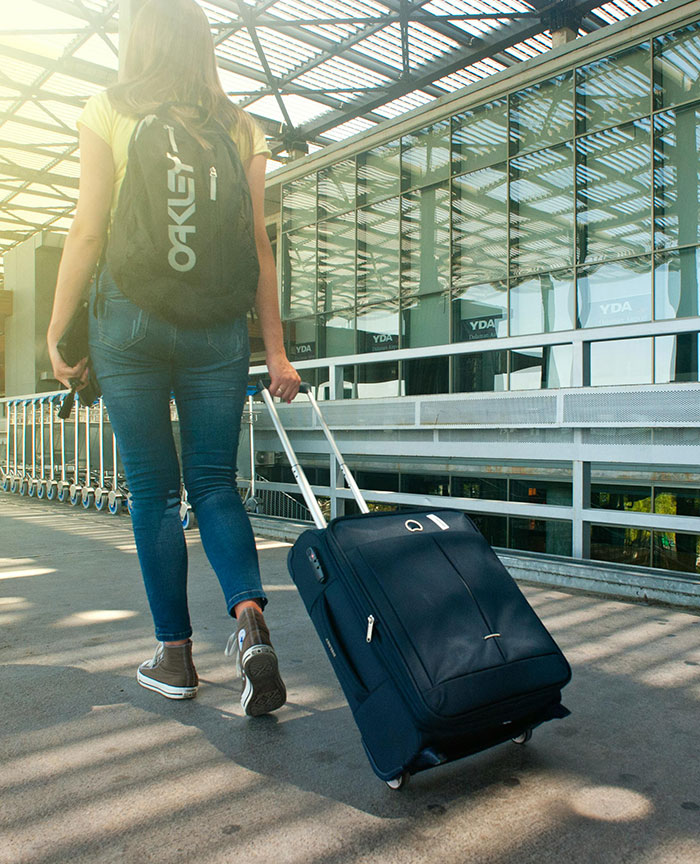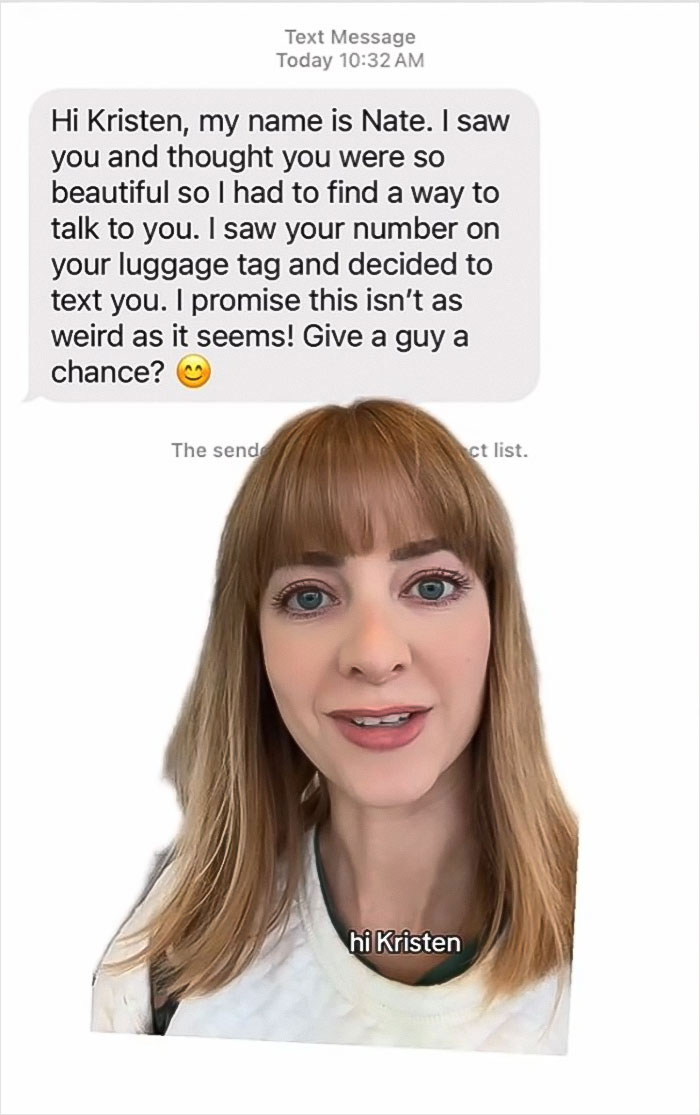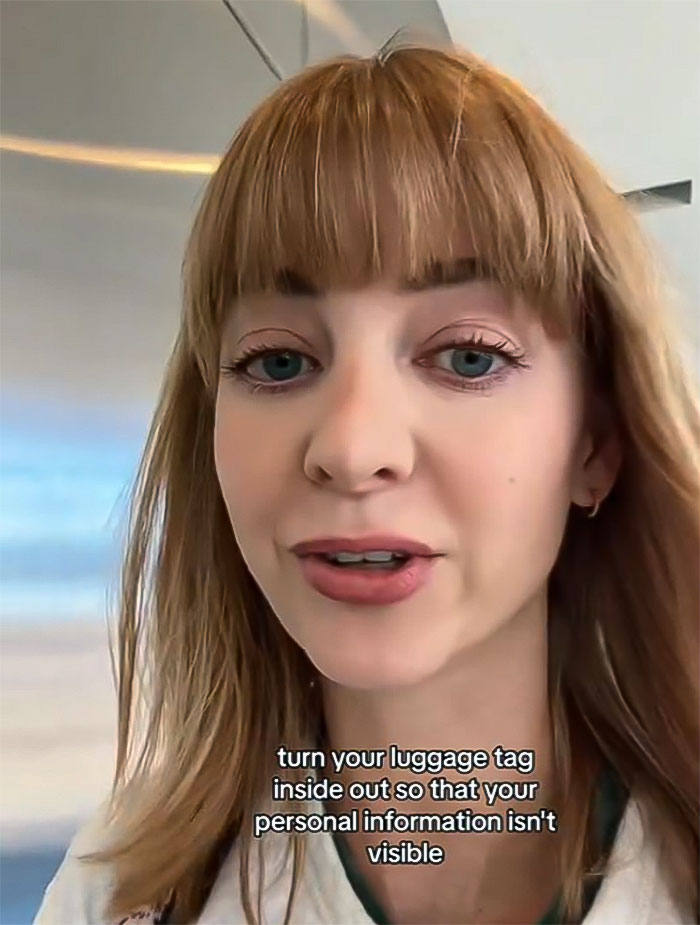A woman sparked concern after revealing that an airport employee had sent her an “invasive” text message. The worker had found her number by looking at her luggage’s tag. The questionable gesture ignited worries, with many people suggesting travel labels with personal information should be kept hidden for safety reasons.
Taking to her TikTok page on June 27, Kirsten posted a video where she revealed the “creepiest thing” that happened to her.
In the video, which has amassed over 23,100 views, the TikToker recalled: “So, I’m sitting there on my layover, and I get this text.”
The texter greeted “Kristen,” spelling the content creator’s first name wrong, before introducing himself as “Nate.”
Kirsten sparked concern after revealing that an airport employee had sent her an “invasive” text message

As per Nate’s text being read in the viral clip, the apparent airport worker informed about his observations of Kirsten and how he found her “beautiful.”
As a result, the romantic man, who needed a way to talk to Kirsten, took it upon himself to collect her personal details from her luggage tag before deciding to text her.
“I promise, this isn’t as weird as it seems, give a guy a chance,” Nate allegedly wrote.
Kirsten wasn’t enjoying any of this attention, countering: “First of all, he spelled my name wrong.”

“Second of all, if he wanted to talk to me so badly, why didn’t he come up and talk to me like a normal human being?
“Like, this just feels like such an invasion of privacy. I have no idea who this guy is.
“Like, I didn’t notice a guy looking at me or anything, and I’m also extra weirded out because, like, I have my address on my luggage tag, so he could potentially know where I live now.”
The worker found her number by looking at her luggage tag

The TikToker went on to advise fellow travelers to turn their luggage tag inside out, warning: “All creepers, do better.”
Many people expressed their disturbances over the anecdote, as a TikTok user even suggested: “Luggage tags with covers only,” to which Kirsten replied: “Yep ordered new luggage tags immediately.”
“This is something that would never even cross my mind!!!” a person commented. “That’s so scary.”

A viewer admitted: “I only put my email address on my luggage tag.”
A commenter recommended: “Reverse number search!!”
A reverse phone lookup is just what it sounds like — rather than entering someone’s name and using it to find their phone number, you start with just a phone number and use a service to reverse search for and discover who the number belongs to, Business Insider (BI) reported in 2022.
Moreover, BI warned against any website that requires you to give up your email address or other personal information to perform a search and be especially wary of sites that perform a lengthy search with a progress bar.
The questionable gesture ignited worries

A real reverse phone lookup should take a fraction of a second; if it takes several minutes, the site is trying to get you invested in the process so you are more likely to pay for the data at the end of the search.
“My jaw literally dropped,” a netizen added. “I’m horrified.”
A separate individual chimed in: “I am so sorry, this is so violating.”
Someone questioned: “Can you report it at the desk with the phone number?”

There are, in fact, laws and regulations designed to protect travelers from harassment or inappropriate contact by airport staff who might misuse private information obtained from luggage tags.
For instance, the European Union’s General Data Protection Regulation (GDPR) protects personal data and privacy for individuals within the EU and the European Economic Area.
GDPR requires organizations, including airlines and airport staff, to handle personal data responsibly and protect it from misuse. Violations can result in significant fines.
The Privacy Act of 1974 in the US governs the collection, maintenance, use, and dissemination of personal information by federal agencies.
Many people suggested that travel labels with personal information should be kept hidden for safety reasons

While it primarily applies to federal agencies, it sets a standard for privacy protection that influences other sectors, including aviation.
Additionally, US airports and airlines must comply with various federal and state privacy laws that protect passengers’ personal information.
Organizations such as the International Air Transport Association have guidelines and standards for handling passenger information securely.
Airlines and airports are expected to follow these guidelines to protect travelers’ personal data.
@kir.a.lo Why are men? #creeper #creepy #greenscreen #ichoosethebear ♬ original sound – kirsten 🍓
While some TikTok viewers weren’t too alarmed by Kirsten’s ordeal, as an observer quipped: “Does this work though? Asking for a friend,” others opened up about their own negative experiences.
A cybernaut shared: “Had the guy who checked me in and scanned my ticket at the gate EMAIL ME ASKING ME OUT before the flight took off bc I was polite, smiled and said thank you.
“He said he felt a genuine connection.”
Another user recalled: “I grew up in [New Jersey] where attendants pump gas for you and one time an attendant followed me on [Instagram] bc he got my name on my debit card that I paid with.”
Kirsten’s TikTok video continued to prompt divided reactions



















